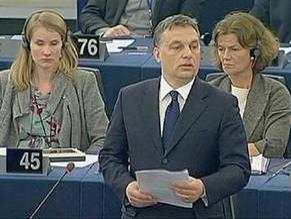|
World Jewish News

Hungarian Prime Minister Viktor Orban addresses the European Parliament in Strasbourg.
|
Hungary PM likened to Chavez and Castro over controversial laws
19.01.2012, Jews and Society Hungary's premier Viktor Orban rejected charges of authoritarianism while seeking to head off EU legal action for flouting democracy in a fiery European parliament debate Wednesday.
Orban, in Strasbourg to defend his government, pledged to row back on disputed laws which have triggered EU legal proceedings against Budapest and inspired MEPs to liken him to Cuba's Fidel Castro or Venezuela's Hugo Chavez.
Brushing aside the charges, Orban said he stood up for "Christian and family values" and claimed to have brought Hungary back from the brink in 18 months -- decreasing debt, overhauling taxes and health and protecting minorities.
Differences with the European Commission would for the most part "easily, swiftly be remedied and resolved", Orban said after pledging to modify controversial laws that brought tens of thousands of protesters onto the streets this month.
"We have to be clear on values, firm on principles," said Commission president Jose Manuel Barroso.
The EU commission on Tuesday threatened to drag Budapest to court for reforms undermining the independence of its central bank, judiciary and data protection authority. It gave Orban a month to reverse the laws.
But some MEPs felt the threat of legal proceedings did not go far enough.
"We say you are taking the road of Chavez, Castro and all the world's totalitarian and authoritarian regimes," said Greens' co-leader Daniel Cohn-Bendit, who called for a delegation to go to Budapest and "ask why it is that homeless people, intellectuals, Jewish intellectuals are afraid."
Former Belgian premier Guy Verhofstadt, leader of the parliament's Liberals and Democrats, accused Orban of being "on the wrong path" and urged an inquiry into whether there was "a risk of a serious breach of our values" in Hungary.
Orban retorted that "we have Christian values, we think that the feeling of belonging to a nation is important and that the family is important."
The national values to which he was referring "are not upheld in this house," he added, referring to the pan-European assembly.
The right-wing Hungarian leader is hoping to obtain a credit line from the European Union and the International Monetary Fund but talks were suspended in December amid concern over the controversial legislation.
But he told a press conference after the debate that lasted most of the afternoon that he would not allow government policy to be dictated.
"If the IMF wants to give us loans very well, we will be more than satisfied," he said.
"But to end up like Greece where the Germans say they won't give loans unless the Greeks do what they demand, I do not want to give off that idea" of Hungary.
"We do not want money from Germany, from the European Union," he said, despite his government having asked for aid.
Barroso said he and Orban would be working over the coming days to find legal solutions, vowing to handle "with the highest priority" an issue that spawned accusations Orban was building a "totalitarian" regime.
"Today I received a letter by PM Orban. He has indicated to me his intention to modify the relevant legislation," he told the parliament.
Wider principles of democracy and freedom in general needed to be addressed, Barroso said, referring to "concerns expressed regarding the quality of democracy in Hungary".
In a separate development, EU commissioner for new media Neelie Kroes, in a letter to Justice Minister Tibor Navracsics, cited the withdrawal of broadcast licences of the sole opposition radio, KlubRadio, and international criticism of the media law.
"The respect of media freedom and media pluralism is not only about the technically correct application of EU and national law but also, and more importantly, about implementing and promoting these fundamental principles in practice," Kroes wrote.
"The Commission will remain particularly vigilant on both aspects," she said in the letter, which was sent on Tuesday.
EJP
|
|
